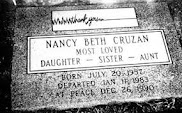Major arguments for and against the ballot measure are summarized by Ballotpedia:
In opposition:
Death with Dignity: "While Death with Dignity is already illegal under current West Virginia law, this constitutional amendment would mark the first time any state amended its constitution to explicitly prohibit aid in dying. Never before has a legislature in this country mobilized an attack like this on terminally ill patients. And to make matters worse, proponents of the ban are on a press tour spreading malicious lies about how Death with Dignity works in states where it’s legal."
Eli Baumwell, interim executive director for ACLU West Virginia: "'Mountaineers are always free' is a promise that the ACLU of West Virginia works every day to ensure is kept. Amendment One runs counter to that promise by enshrining a prohibition into the state constitution designed to take away the last free choice Mountaineers can make. West Virginians, like most Americans, do not believe that the government should interfere in personal medical decisions. As shown by the Legislature going zero for four last year in seeking permission from the people to modify our Constitution, they do not represent the will of the people. Instead, they represent a dangerous and out of touch minority: lawmakers who want to take the last medical decision you can ever make about yourself."
In support:
State Del. Pat McGeehan (R-1): "There’s this phenomenon of nihilism that’s sort of spreading across the country, and I think it’s an important issue we need to address. To the best of my knowledge, we’ll be the first to place this and take a stand in the state constitution."
State Del. Pat McGeehan (R): "That’s why it is vital to vote for Amendment One this November. It secures our state from medically-assisted suicide and the culture of indifference and carelessness it promotes. It affirms the goodness of suicide prevention. And it sends a clear and confident message that West Virginia is not a place of fear and despair, but a state of courage and hope."
Mary Tillman, legislative coordinator for the West Virginia alliance for Ethical Health Care: "If there is a fear of pain at the end of life, good palliative care and hospice care are ways to provide comfort and care until a person’s life ends naturally. A vote FOR Amendment One will protect all West Virginians from physician-assisted suicide. This November, please vote to keep West Virginia a state where all lives are valued and protected."
Ms. Tillman's point about "good palliative care and hospice care" is only half right. Palliation and hospice care are designed to provide relief from suffering, but relief is far from inevitable. In a pioneering article in the New England Journal of Medicine, Dr. Tim Quill (coincidentally, a graduate of Amherst College, Class of 1971) wrote about the last days of his patient, Diane, who was dying of leukemia:
Bone pain, weakness, fatigue, and fevers began to dominate her life. Although the hospice workers, family members, and I tried our best to minimize the suffering and promote comfort, it was clear that the end was approaching. Diane's immediate future held what she feared the most — increasing discomfort, dependence, and hard choices between pain and sedation. . . .
Although I know we have measures to help control pain and lessen suffering, to think that people do not suffer in the process of dying is an illusion. Prolonged dying can occasionally be peaceful, but more often the role of the physician and family is limited to lessening but not eliminating severe suffering. [italics added]
"Death and Dignity — A Case of Individualized Decision Making," N Engl J Med 1991;324:691-694 (March 7, 1991). Any argument that ignores this harsh reality lacks scientific, medical, and moral authority.
Finally, I want to end with the point that Prof. Sarat makes at the outset of his op-ed:
Donald Trump’s surprisingly decisive electoral victory was a serious blow to those who value freedom and human dignity. . . .
His version of freedom does not include respecting the choices that individuals make about their own bodies. . . .
And while our attention was focused on those assaults on bodily autonomy, voters in West Virginia, where the MAGA ethos reigns supreme, passed a ballot measure amending their state constitution to prohibit people from participating in “the practice of medically assisted suicide, euthanasia, or mercy killing of a person.”
Passage of West Virginia's ballot measure represents a victory for MAGA-types and MAGA-adjacent pro-life absolutists like the National Right to Life Committee and its various state affiliates. They added end-of-life decision-making to their traditional focus on reproductive decision-making three decades ago and have advocated relentlessly and quite successfully to curtail patient rights ever since.


